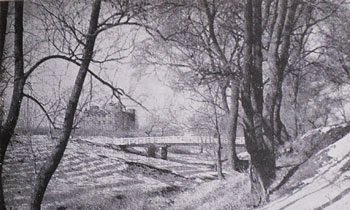 For the outsider, the metropolis—a visual, tangible representation of the economic activities that it sites—appears to be endlessly seductive, complicated, and enthralling. And yet, for the urbanites themselves, both the skyline and the economy that it harbors inspire tedium; when will these games terminate, these spectacles that bring us no closer to a utopian community but merely run down the clock prior to the moment of judgment? What appears superficially to be busyness (e.g., business) is in fact a gigantic conspiracy for the wasting of everybody’s time, resources, and cognitive ability. At least, that is the way that it appeared to the revolutionary urban intellectuals of East Asia’s 1930s, both those from Tokyo as well as those from Shanghai; the former group, motivated by a critique of capitalism, would be involved in the creation of much of the built structure of an East Asian modern, while the latter became architects of the Chinese Communist Revolution. The revolutionary impulse of the Japanese progressives in Manchuria was realized as technocracy; however, deeper insecurities about the nature of capitalist modernity haunted the thoughts and work of the men who, while articulating a system of modern infrastructure across the Great Northern Wasteland, simultaneously brooded upon the limited and constricting nature of the society within which they existed.
For the outsider, the metropolis—a visual, tangible representation of the economic activities that it sites—appears to be endlessly seductive, complicated, and enthralling. And yet, for the urbanites themselves, both the skyline and the economy that it harbors inspire tedium; when will these games terminate, these spectacles that bring us no closer to a utopian community but merely run down the clock prior to the moment of judgment? What appears superficially to be busyness (e.g., business) is in fact a gigantic conspiracy for the wasting of everybody’s time, resources, and cognitive ability. At least, that is the way that it appeared to the revolutionary urban intellectuals of East Asia’s 1930s, both those from Tokyo as well as those from Shanghai; the former group, motivated by a critique of capitalism, would be involved in the creation of much of the built structure of an East Asian modern, while the latter became architects of the Chinese Communist Revolution. The revolutionary impulse of the Japanese progressives in Manchuria was realized as technocracy; however, deeper insecurities about the nature of capitalist modernity haunted the thoughts and work of the men who, while articulating a system of modern infrastructure across the Great Northern Wasteland, simultaneously brooded upon the limited and constricting nature of the society within which they existed.
|
|
||||
|
Telos Press Publishing · PO Box 811 · Candor, NY 13743 · Phone: 212-228-6479 Privacy Policy · Data Protection Copyright © 2025 Telos Press Publishing · All Rights Reserved |
||||


